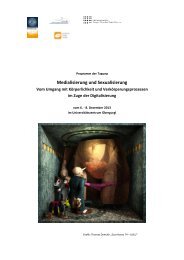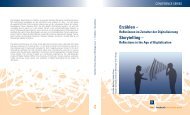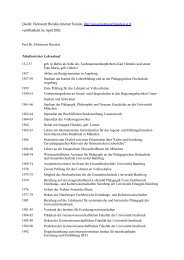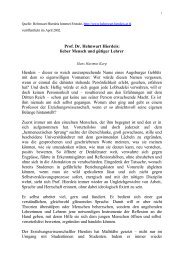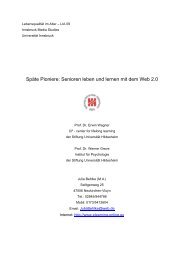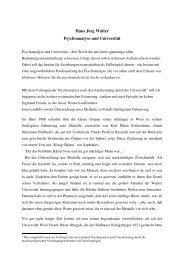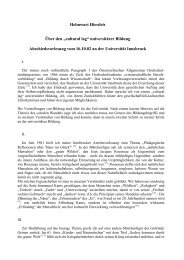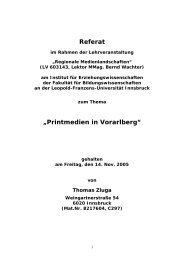Download pdf - Universität Innsbruck
Download pdf - Universität Innsbruck
Download pdf - Universität Innsbruck
Erfolgreiche ePaper selbst erstellen
Machen Sie aus Ihren PDF Publikationen ein blätterbares Flipbook mit unserer einzigartigen Google optimierten e-Paper Software.
Some of the social logics of sharing 47<br />
so on. In brief, “sharing” is the word that describes our participation in Web 2.0, but the<br />
meaning of “sharing” in this context is new.<br />
One way of showing that there is a new meaning of the word “share” is to look at how it is<br />
used in a new context. To this end I analyzed the front pages of 44 social network sites at<br />
monthly intervals from their establishment through to the present day. Three main findings<br />
emerged. First, the objects of sharing in SNSs become fuzzier. If at first the sites asked us<br />
to share photos, or Web journals, or thoughts, with time the objects of sharing began to<br />
include such vague things as “your life,” “your world,” and “your true self.” This usage of<br />
sharing did not appear before 2007. Second, the word “share” began to appear without an<br />
object at all. That is, SNSs started running taglines such as “Join! Connect! Share!” The<br />
use of the word “share” without an object implies that by now (the first instance of sharing<br />
without an object was found in 2005) users know what “Share!” means in the Web 2.0<br />
context. Third, activities that used not to be described as sharing became to be thus portrayed.<br />
For instance, in 2002, the front page of the photo-sharing site Fotolog contained<br />
the text, “Make it easy for friends/family to see what’s up with you. Put your latest, greatest<br />
digital photos on the Web in a log format.” In 2007, though, it introduced the tagline,<br />
“Share your world with the world.”<br />
This new type of sharing has a different political economy from what we normally think of<br />
as sharing. A naïve perspective on sharing is that when we share something, we are left<br />
with less of whatever it was that we shared. With this type of Web 2.0 sharing, however,<br />
the political economy is different. If one surfer shares a link with another, this obviously<br />
does not mean that there is less of the website to go around. Indeed, putting aside the place<br />
of sharing in creating and sustaining social ties, sharing in Web 2.0 as described above is<br />
actually productive in quite a literal sense: the act of sharing leaves a physical trace on a<br />
server owned by a commercial enterprise. If normally sharing leaves us with less, here<br />
sharing produces the data that constitute the hard currency of Web 2.0 businesses. The<br />
value of the data produced by Web 2.0 sharing does not accrue to me, but rather to the<br />
platform through which I am sharing.<br />
So there is a new meaning of the word sharing, and a new political economy to go with it.<br />
While the political economy has been studied, the notion of sharing itself, including a critique<br />
of its use in order to mystify commercial relations, has not (but see Fuster Morell,<br />
2011 on “wikiwashing”).<br />
3. Sharing economies<br />
Sharing economies are those in which money, or more specifically, the ability to make it,<br />
is not a relevant factor in motivating participation (see especially Benkler, 2004, 2006).<br />
Sharing economies can be usefully divided into two types: sharing economies of production,<br />
and sharing economies of consumption. The paradigmatic example of a sharing



